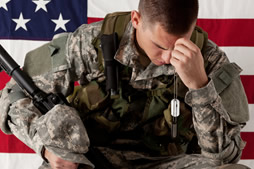PTSD Disability Claims

Veterans who have developed post-traumatic stress disorder (PTSD) as a result of military service are eligible to receive disability compensation for their condition. PTSD is a serious disorder that requires ongoing treatment which may not be possible if the veteran is not awarded an adequate amount from the VA.
Were you denied compensation for your PTSD claim? Is the compensation you are receiving enough to cover medical expenses, the cost of therapies or lost wages? Vets National Advocates is here to help.
Experiencing shock or devastation after a traumatic event is a normal human reaction. When a veteran has a stress reaction that impedes their ability to lead a normal life, there may be a deeper issue.
Are you suffering from post-traumatic stress disorder, or PTSD? For some people, this condition can take years to surface. Filing a claim will help you get the veterans disability benefits you deserve.
Contact Vets National Advocates today for your free consultation. We only work on a contingent fee basis so you don’t pay us anything unless your claim is successful.
What are the VA Requirements for PTSD Claims?
In the past, the VA has maintained strict requirements for claiming PTSD disability. In 2010, the VA enacted new rules that relaxed the requirements for proving PTSD, making it easier for more veterans to get help.
To establish a direct service connection for PTSD, veterans must have:
- A current PTSD diagnosis
- A statement about the event that caused their trauma
- Consistency between the veteran’s statement and the conditions of their service
- A medical opinion that the stressor had a sufficient enough impact on them to cause PTSD
Diagnosing PTSD
PTSD is a result of a person experiencing a traumatic event. Any number of situations can trigger PTSD for service members, as they are routinely exposed to stressful and traumatic occurrences.
Common symptoms of PTSD may include:
- Reliving the event, or flashbacks
- Feelings of detachment, emotional numbness or depression
- Avoiding situations that are reminiscent of the traumatic event
- Not talking about the traumatic event
- Living in a constant state of alertness or readiness for danger
- Loss of interest in normal daily activities
Veterans experiencing these symptoms should contact a health care professional to determine whether they are suffering from PTSD.
Symptoms of PTSD in Veterans
One of the main differences between a normal stress reaction to a traumatic event and PTSD is that PTSD symptoms do not lessen in severity over time.
Veterans with PTSD may continuously re-live the event, try to avoid situations that remind them of their trauma, or be hypersensitive to situations they perceive to be dangerous.
There are four common types of PTSD symptoms:
Also known as re-living, or re-experiencing, the event.
Are you having nightmares? Can you see, feel, hear or smell the details of the traumatizing event? Flashbacks are powerful sensory experiences that can be triggered by something as small as a car backfiring.
Places, emotions or situations that trigger a memory of the trauma may become something you avoid. You may stay away from crowds, you may avoid driving if your accident took place in a car. You may even avoid watching movies with scenes that remind you of what you lived through.
The way you think about yourself and others might be affected by your trauma. You may not have positive or loving feelings toward others; you may avoid relationships; you may think the world is exceedingly dangerous; you may distrust everyone.
Feeling constantly “on-edge” or looking for the danger in every situation. You may feel irritable, easily agitated and ready for a fight.
If your symptoms persist for longer than three months, cause you intense distress or disrupt life at home or at work, seek medical attention. The VA recognizes PTSD as a severe mental illness affecting a large number of service members.
Military Sexual Trauma and PTSD
PTSD may also result from an unwanted sexual event, which includes any form of forced sexual contact or contact that took place without the victim’s consent. Military sexual trauma (MST) is not only a result of the event itself, but the fear of retaliation if the event is reported.
Statistics from the VA show that in 2012, 23.6% of female veterans seen for health care reported a history of MST. Men also report suffering sexual assault while in the military.
Disability compensation is available to both male and female veterans who have suffered MST or who developed PTSD as a result of MST. In these cases, the veteran must have some proof that the sexual event occurred to receive disability compensation for it. However, in recent years, the VA has created less strict evidentiary requirements and will now accept a variety of what they call “markers”, which can include various signals, occurrences, or circumstances that would indicate a traumatic event took place.
Help with PTSD Claims for Veterans
If you are struggling with PTSD, a denied benefits claim may seem devastating. Don’t give up! Vets National Advocates can help you file an appeal and fight for the compensation you and your family need to help you successfully recover and live a full life.
You deserve the benefits you’ve earned for the trauma you’ve endured.
Contact us online now or call us at 1 (877) 777-4021 to connect with one of our advocates.


